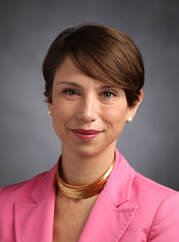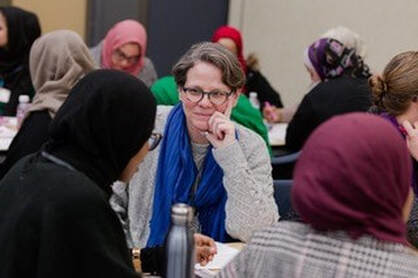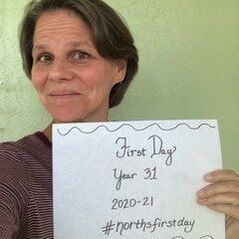|
Angela Wilcox, Beloved Community Staff Team When I was fourteen, my mother insisted that I take an “Assertiveness Training” course offered by my high school during J-term and taught by a psychologist who was a family friend. The very thought terrified me, but the great irony was that my inability to assert myself to oppose this idea meant I spent a week of January learning how to do all the things I thought I couldn’t do: make a cold phone call to ask for information; return an item of clothing; and hardest of all, enter a space where I didn’t know a single person. This week was one of the most significant in my education because of what it taught me about being human in community; Dr. Warloski gave me permission to feel uncomfortable and do the thing anyway. Her goal was to help us feel the truth that discomfort would not kill us, and that often, our paralyzing fears dissipated once we stepped over the boundary and realized that we were not alone — not in our fears, but also not in our values, beliefs, and wonder. My high school was parochial in all senses; I felt a suffocating need to get away from the sameness of that world. In college, I was surrounded by smart, curious people from all over the world. United by our academic drive and our willingness to live through Minnesota winters, we were rich in diversity of experiences, opinions, and dreams. We reveled in unveiling the quirky regionalisms that shaped us and the ways we spoke, played, and understood the world. I became aware of parts of my identity that had been hidden from me because they were so ubiquitous back home. In this temporary and carefully curated educational community, we took the time to explore our differences and share our stories. In graduate school, I gravitated toward courses and social groups filled with international students. I married one of them, we traveled the world together, and I embraced the feeling that I had finally stretched beyond the sameness of my hometown and into the world. After a decade of marriage and a divorce, what I longed for most was a spiritual home where I belonged — someplace where the values and the people felt familiar. From the first Sunday at Unity Church, everything from the religious education program to the music to the flow of the service made me feel like I was home again. And yet, Unity felt like the church of my future, where I had much in common with others, and could raise my children and myself in this new version of my life. I worked in a junior high classroom rich with diversity of all kinds — age, race, culture, language, nationality, ability, and more. As I tried to connect to my students authentically across our many differences, I was often uncomfortable, and these youth invited and pushed me into spaces that stretched me even further into discomfort. I knew from experience that discomfort wouldn’t kill me, but I learned that it takes ongoing practice to stretch and remain humble enough to stop focusing on my discomfort and start listening. Unity has helped me build and sustain those essential ongoing practices. One of my favorite “stretch” experiences has been attending the annual RISE (Reviving the Islamic Sisterhood for Empowerment) conference with some of my Muslim students. During a panel discussion of professional Muslim women, one of my students pulled me aside with tears in her eyes; she’d never met an adult Muslim woman with a career and didn’t know that could be a possibility for her. I’d been so focused on the idea of helping these young women experience a place with other women like them that it hadn’t occurred to me how enormously diverse this gathering would be and what the power of that diversity might be for my students. Where was I missing that diversity in my own life, in spaces that I thought of as being “just a lot of people like me?” Here at Unity, we have expressed our longing to be a multicultural spiritual home grounded in racial healing. What if the way we start is by asking what stories, backgrounds, perspectives, and beliefs we might have missed because so many of us share more obvious identity traits? What if our particular, specific identity is our superpower? That work, along with cultivating ongoing spiritual practices that help us remain humble and resilient in the face of discomfort, might help us live our way into that longing in unexpected and world-altering ways.
Learn more about RISE on their website: www.revivingsisterhood.org.
4 Comments
By Mary Pickard
I had the privilege of interviewing five Unity Church members about how they identified their own personal passions, talents, and particular opportunities to promote racial justice and multiculturalism beyond the boundaries of Unity Church. They reflected on the tools Unity has provided, the spiritual grounding that propels them to create change, and the struggles that have opened them to learn and transform. When asked to describe what she does to apply antiracism and multiculturalism in the larger community, Eileen Galvin asked, “Is it about the things I need to do, or is it a way of being that must be applied to all things?” As a communications professional at Friends School of Minnesota, a Quaker K-8 program, Eileen is called to antiracism work every day because of a school-wide commitment to abolish white supremacy. She finds that Unity has helped her notice and reflect on what’s happening, leading to personal transformation. When she heard Dr. Robin DiAngelo talk about white privilege at Unity, Eileen’s reaction was, “I did all those things associated with white privilege. I knew there was stuff I didn’t know, but I didn’t know how much.” Results from the Intercultural Development Inventory (IDI) at Unity gave her tools for charting her own development — tools for reflection. “I was raised to know this is not a fair system. As a white person learning more about how white supremacy runs through all our systems, I can’t not do this work. I can’t be okay with an unjust system that systematically oppresses people.” It doesn’t jibe with “the inherent worth and dignity of every person.” Merrill Aldrich and Nate Solas both work in IT — a profession they say is dominated by white men. What Merrill calls the “dam-breaking moment” happened in his workplace when a Black employee talked about what was going on in his life and why this global conversation about George Floyd’s murder was important to him. His speaking up opened the door to further conversation and to Merrill stepping up. He volunteered to lead internal discussion among the 65 employees. “The most important thing to focus on was to open the conversation so people don’t feel it’s taboo to talk about racism and multiculturalism. It was important to help people work through the awkwardness, shame, and fear so we could be open to learning. We must understand that sometimes good intentions have negative impacts on people.” That’s a lesson Nate learned as well. A conversation with a new female hire was his “wow” moment. “Our best efforts to welcome her were good, but not good enough. She felt discounted so we needed to realize our efforts weren’t landing the way we intended. There is a tendency for people to treat everyone the same — but we need to recognize that life experiences are different. It’s not enough to make the hire and assume you’re done. We need to check in more and listen.” Mary Baremore is acutely aware of difference as a sign language interpreter for people who are Deaf, DeafBlind, and Hard-of-Hearing. Most interpreters are white, well-schooled women. “There is an elitism and supremacy that comes from being able to hear. It’s called ‘audism.’ We must look at how we benefit from being hearing and how we use it in various ways within the deaf community. Layer race on top of that and there is increased complexity.” Unity “opened up the flood gate” for Mary to think about how she uses language. “I think all the time about the appropriateness of me interpreting for an African American man, for example, who has a different way of expressing himself. I must be aware of his culture and my culture and reflect on the language I’m using. I know I’ll never be fully adequate. Unity brings an invitation to be courageous; to know that we will fail every day and not give up; we will get back up and do better.” Angela Wilcox recalls her discomfort. “Even though I had done a lot of antiracism work, I had been told it was wrong, uncomfortable and rude to talk about race.” When Janne and Rob Eller-Isaacs talked about race from the pulpit and their own discomfort, it “transformed how I thought about discomfort as a spiritual practice,” said Angela. “It gave me the courage to talk about it at work and that broke ground, so people opened up.” As an educator in the Hopkins public schools, Angela has made a point of incorporating antiracism work into all her activities and continuously engaging her colleagues in the conversations and training. She has found the IDI and accompanying coaching helpful. “What clicked for me was that it’s important to meet people where they are and not where you think they should be. Antiracism training can make people defensive. We need to move into curiosity and not shame.” Next Right Actions IDI: The opportunity to take the Intercultural Development Inventory is available to every Unity Church member. Email Drew Danielson for more information at drew@unityunitarian.org. In the Justice Database: Learning for Justice: Free resources for K-12 on dismantling white supremacy and advancing human rights. Antiracism Literacy Partners: Wednesday, June 23, 7:00-9:00 p.m.  Mary-Margaret Zindren, Beloved Community Communications Team Beloved Community Staff Team note: As we continue the work of living into our Ends and creating an anti-racist, multicultural spiritual home, we are being called to explore more deeply the important role of culture and the sense of welcome and belonging we create -- as individuals and a community -- for newcomers. What we experience as welcoming or unwelcoming is informed by cultural identity, and how well we communicate across cultural differences. This month the Beloved Community Staff Team shares Mary-Margaret Zindren's story of what brought her to Unity Church and where she found connection. We know there are many stories that speak to our individual experiences as newcomers. If you are willing to share your story, please email pfeichten@yahoo.com; we would love to hear and learn from you. There is a reason why there are Kleenex boxes in the pews at Unity Church. I wasn’t the first to need them, and I surely won’t be the last. I learned about Unity Church in a roundabout way from Gary DeCramer, my then professor at the University of Minnesota Humphrey School. He had invited a community activist from India to speak at my graduate seminar. The activist was profound and inspiring. I asked why he was in Minnesota and he mentioned he was invited to speak at Gary’s church. That intrigued me. A church that was giving this man a platform seemed like a place I should check out. I hadn’t stepped inside a church for nearly ten years. My mom was Catholic and I attended Catholic schools growing up. My father was somewhere between agnostic and atheist. At a certain point I came to question nearly everything coming from the pulpit. At Catholic services, I bristled at saying words I didn’t believe. So, it was with some trepidation that I arrived at Unity Church. That trepidation was elevated by the fact that I literally couldn’t find the door. This was before the entrance was transformed; there was still a cloister around the church. I must have been late, because there wasn’t anyone to follow. The actual way in didn’t look like a door at all — more like a secret entrance on a wall. Once inside, I was greeted warmly by someone with a “welcome” button on their shirt and directed to where I should go for the service. The church was beautiful. I was grateful I could sight read music and was able to sort of follow along with the opening song. When I sat down, I sat on a Kleenex box. There was an invitation to greet our neighbors. I was used to the Catholic version, saying “Peace be with you,” but in this case people were using their own words, which moved me. There was a swell of noise and you could almost feel the connections growing around you. After the minister reined everyone back in to continue the service, that feeling of connection remained. And then it happened — the Embracing Meditation. It felt like a calling in for those within and beyond the church walls. The minister said, “Your gifts and your wounds are welcome here.” It felt like these words had been spoken directly to me. The fact was, I was wounded. I had been grappling with PTSD following a trauma and wasn’t doing well. It was probably why the idea of returning to a faith community seemed like a good idea for the first time in a decade. I started to cry. And then I remembered there were tissues right there waiting for me. At the end of the service, I stood in line to thank the ministers. I think I actually hugged them. I went to the Parish Hall and there were donuts. And there was coffee. And there was Gary. He introduced me to people I now consider friends. Attending services has been hard for me sometimes. It may have to do with that first visit. Hearing “your gifts and your wounds are welcome here” brings me back to that difficult time in my life. But I would never want those words removed from the Embracing Meditation. There is someone out there who, upon attending Unity Church for the first time, may hear those words and feel that they have found a home. We should keep the Kleenex boxes, too. |
Topics
All
Beloved Community ResourcesUnity Justice Database
Team Dynamics House of Intersectionality Anti-Racism Resources in the Unity Libraries Collection Creative Writers of Color in Unity Libraries The History of Race Relations and Unity Church, 1850-2005 Archives
April 2024
Beloved Community Staff TeamThe Beloved Community Staff Team (BCST) strengthens and coordinates Unity’s antiracism and multicultural work, and provides opportunities for congregants and the church to grow into greater intercultural competency. We help the congregation ground itself in the understanding of antiracism and multiculturalism as a core part of faith formation. We support Unity’s efforts to expand our collective capacity to imagine and build the Beloved Community. Here, we share the stories of this journey — the struggles, the questions, and the collaborations — both at Unity and in the wider world.
The current members of the Beloved Community Staff Team include Rev. Kathleen Rolenz, Rev. KP Hong, Rev. Lara Cowtan, Drew Danielson, Laura Park, Lia Rivamonte and Angela Wilcox. |

